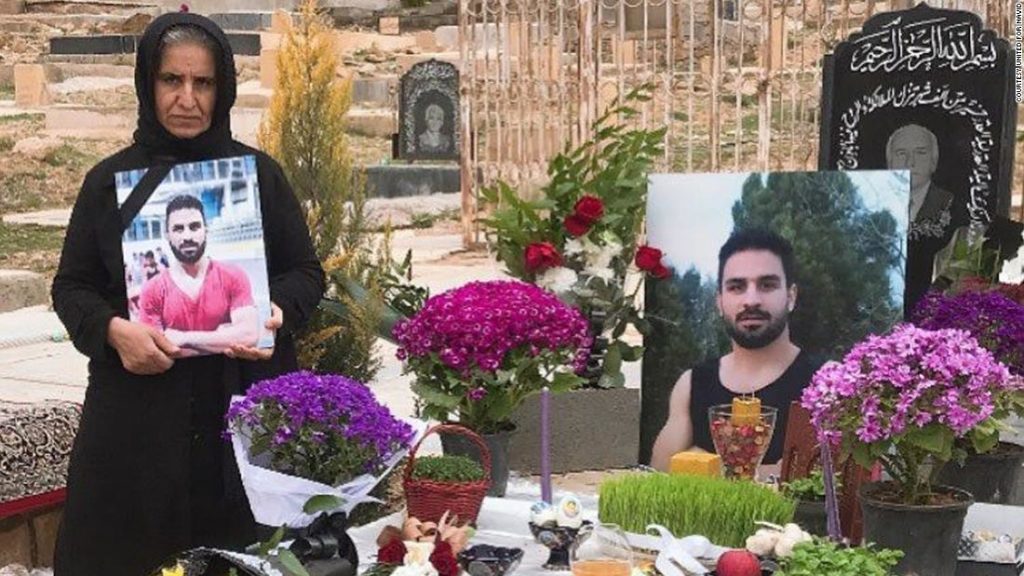“My motivation [for speaking out] is for my two sons who have now been imprisoned for a year in Adel Abad prison,” she says via video call from Iran, on the eve of the first anniversary of Navid’s death.
“The situation has taken control of our lives. We are emotionally and mentally drained. We have no peace. None of us.
“My daughter, myself, my children […] my other two children. We have no peace. I mean our days and nights have turned into all dark nights. You understand? We are not living at all.”
On September 12, 2020, Navid Afkari was hanged for a crime that his family, friends and human rights activists say he didn’t commit.
According to the official version of events, he killed Hassan Torkman, a water company security employee, during a protest in Shiraz on August 2, 2018. Those close to him acknowledge that he attended the protest, saying he was troubled by discrimination against women and the poor.
But his supporters say that his trial was devoid of any compelling evidence against him.
Afkari and his brother Vahid were arrested a month and a half later, on September 17 according to the UN, and another brother, Habib, was rounded up later that year.
Navid was condemned to death while Vahid and Habib received prison sentences of more than 33 and 15 years respectively. All were to be punished with 74 lashes each, according to Amnesty.
Initially, Afkari confessed to the crime, but in court, he retracted those words, arguing that he had been tortured during his interrogation and that a false confession had been forced out of him.
Leaked audio clips from the trial last year revealed Afkari defiantly challenging the judge – inspiring other athletes to speak out against the Iranian government. An action group, United for Navid, now works on keeping his voice alive.
Iranian athletes say they often fear for their lives when speaking out about social and political issues, while sportswomen are sometimes stopped from participating due to fundamentalists limiting women’s freedoms and imposing an interpretation of Islamic law which in turn restricts their ability to compete.
In Iran, political activists and their families are routinely intimidated, arrested, and can even be executed. Afkari was one of at least 267 people who were executed in Iran in 2020.
The Iranian government has said repeatedly that Afkari was not tortured and that his confession wasn’t forced. In June, CNN asked the government if he received a fair trial but has still not received a response.
Namjoo says the support from other athletes has been a “good feeling” and says it’s as though Navid has been “brought back to life” as a result.
“Navid’s name is the message of freedom,” Namjoo adds. “Anyone who comes to Navid’s grave says the same thing: ‘Navid means freedom.’
“Many people come to pay their respects [to Navid] and say these things to us: ‘Navid was born one time in your home, but he was born again many times over in the hearts of Iranians all over the world.'”
But after her youngest son was executed and her two other sons imprisoned in what she says is solitary confinement, Namjoo wants action.
Many human rights groups have advocated for better treatment of Iranians, but Namjoo says written statements alone won’t save her family.
“So many human rights authorities and organizations gave so many statements saying that my kids have not committed any crimes and nothing happened, it had no effect,” she says.
“They killed my baby, innocent, they took his youth and killed him without telling us anything, without us even knowing anything.
“Is there anyone who can come to my aid and help me? Is there anyone who will hear my voice? Will anyone save my children?
“My son Habib’s newlywed wife of three years is waiting for him — is there anyone out there who can save him?
“Is there anyone in this world who will hear my voice? Or is this all just talk?”
You may also like
-
Super League: UEFA forced to drop disciplinary proceedings against remaining clubs
-
Simone Biles says she ‘should have quit way before Tokyo’
-
Kyrie Irving: NBA star the latest to withhold vaccination status
-
Roger Hunt: English football mourns death of Liverpool striker and World Cup winner
-
‘Every single time I lift the bar, I’m just lifting my country up’: Shiva Karout’s quest for powerlifting glory

